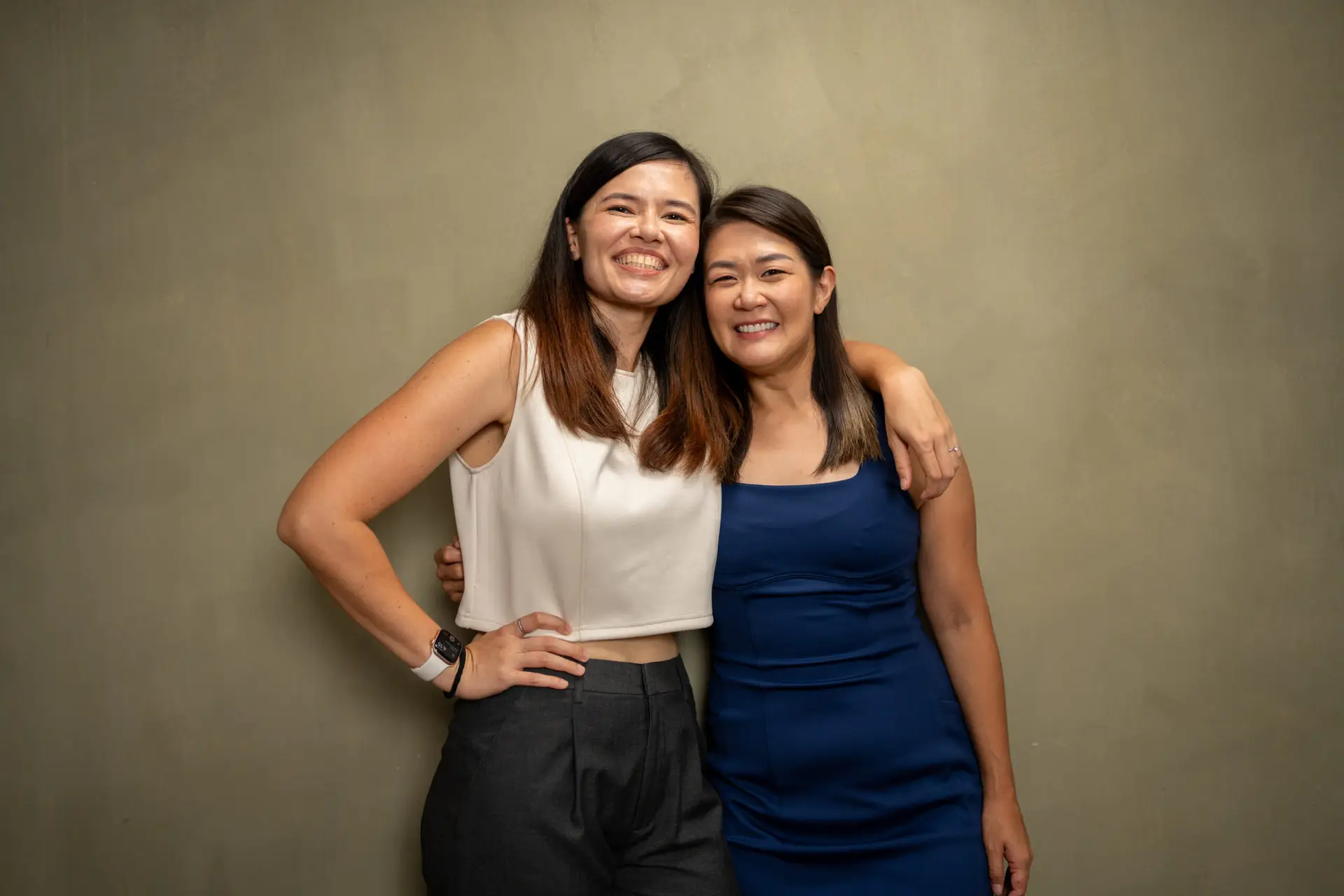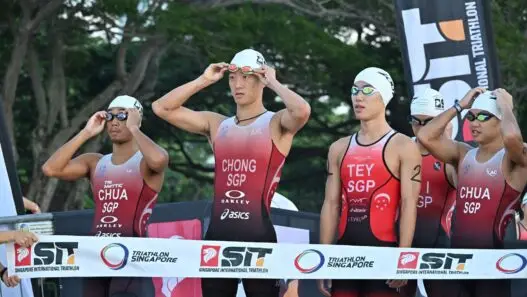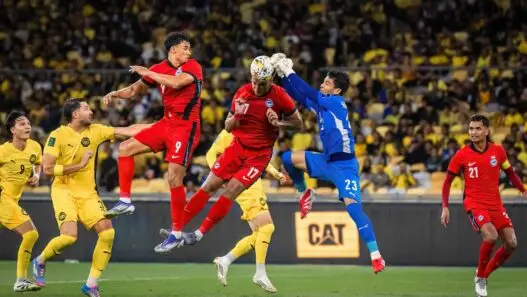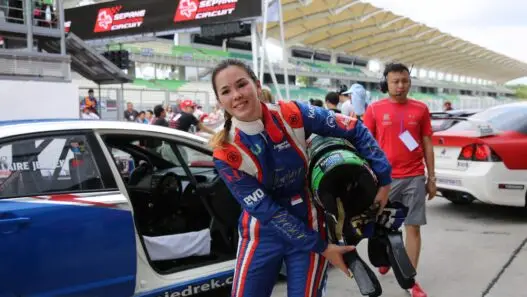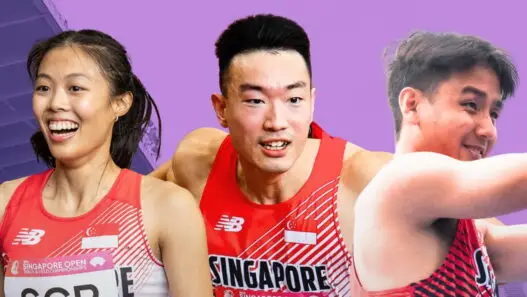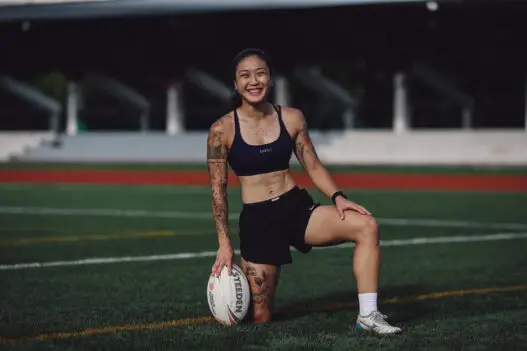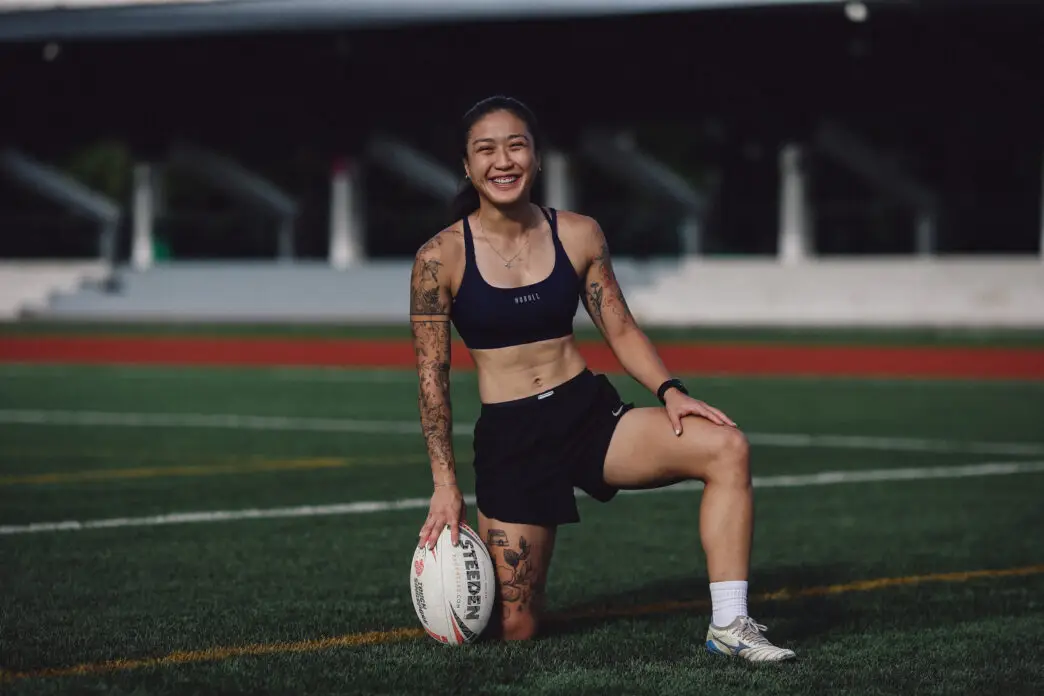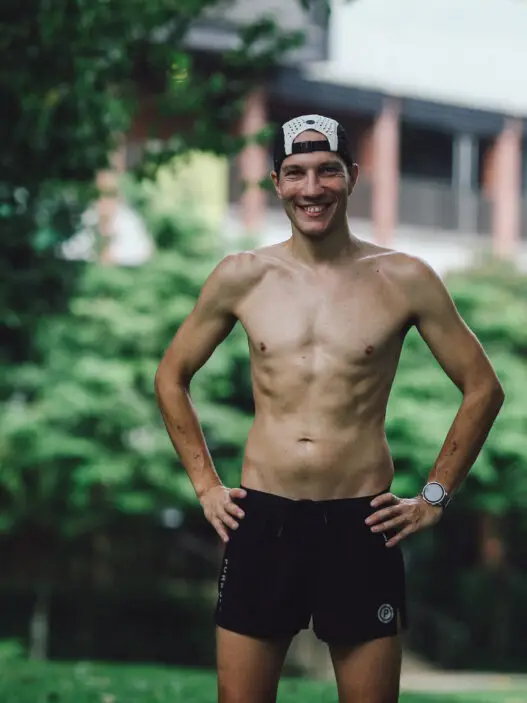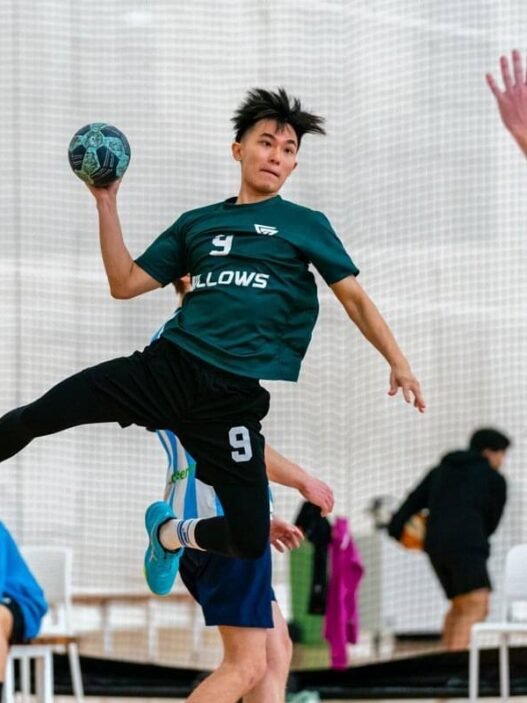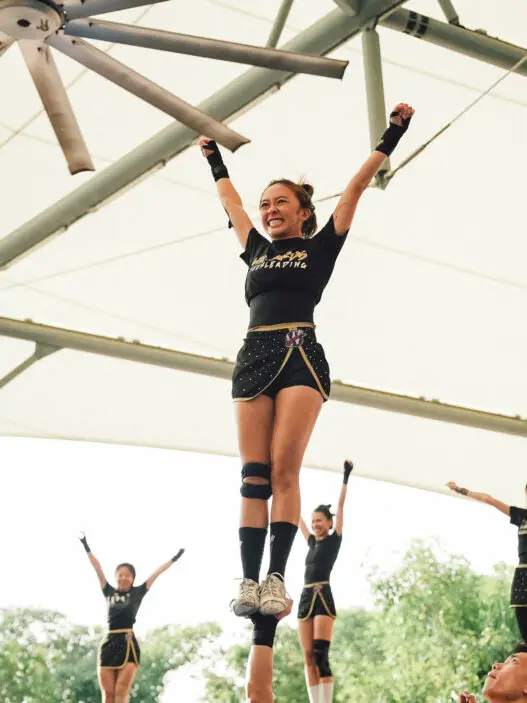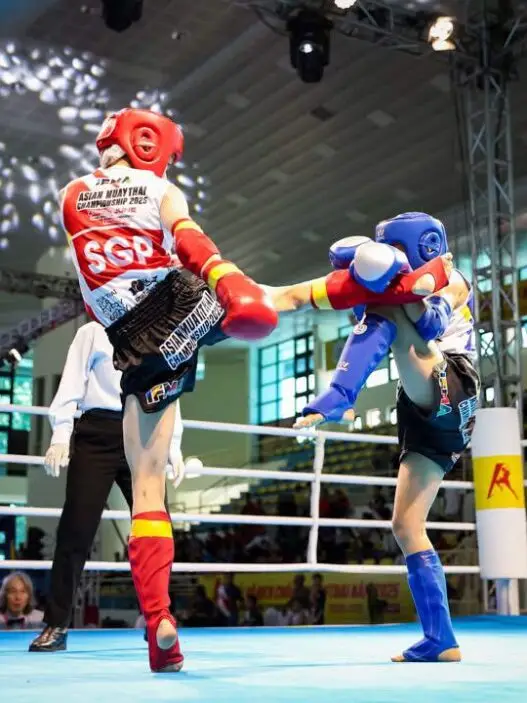Name
Age
Status
Occupation
Jayne Chan
26
Attached
Financial Analyst
Food: I wouldn’t say I follow a strict diet, but I’m definitely more mindful of what I eat leading up to tournaments. In the days before a Rugby Sevens weekend, I usually increase my carbohydrate and protein intake to make sure I have enough energy and fuel, especially since we burn a lot during games and don’t eat much in between matches, apart from small snacks.
On a regular basis, I just aim for balanced meals with the usual mix of carbs, protein, and fibre. I’m not overly restrictive, though. I’ll still enjoy a cheat meal, some chocolate or dessert here and there. It’s all about moderation and making sure I’m fuelling my body in a way that supports both performance and recovery.
Exercise: Right now, we’re in season, so my weekly routine usually includes 2 to 3 field training sessions and 2 gym sessions. I try not to do more than what’s programmed, unless it’s for rehab or individual skill work, just to keep my body primed and fresh for upcoming competitions.
During the off-season, I make it a point to stay active. I run at least twice a week, focusing on a mix of speed work and endurance, and I get in 2 to 3 strength sessions to maintain overall conditioning.
Outside of structured training, I still enjoy staying active in more relaxed ways – cycling, going for walks, and sometimes shooting hoops with friends. It’s a nice balance that keeps things fun and helps me reset mentally too.
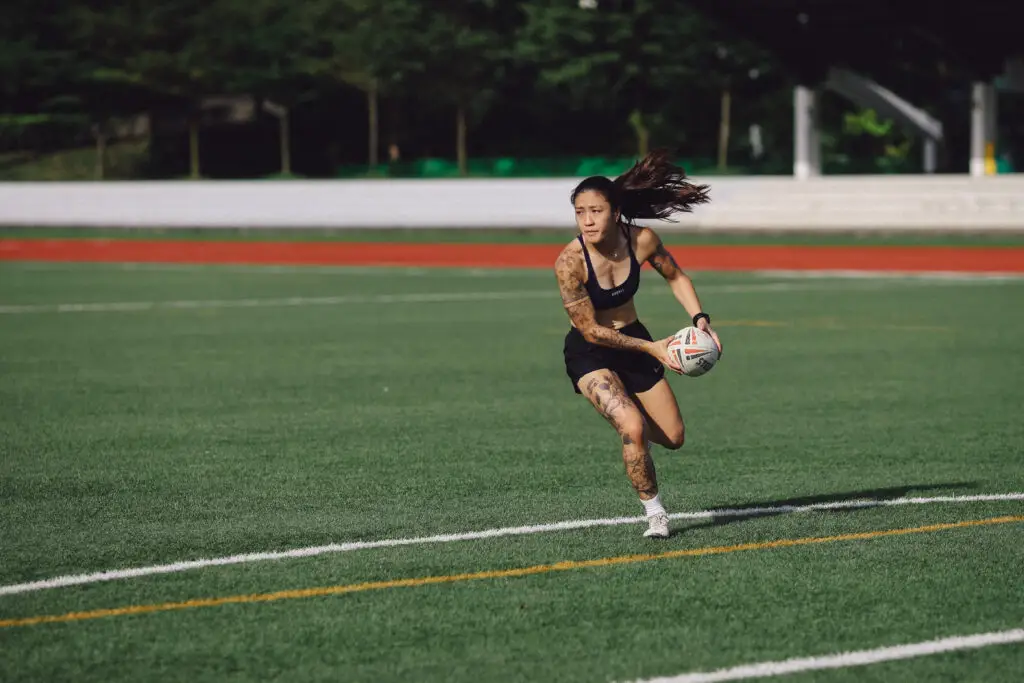
When you were younger, were you active in sports?
I have always been in sports since I was a kid. I learned how to play basketball at 3 years old and was playing competitively since I was 8. I took part in many CCAs just for fun, but always moving. I remember the kids around my block, we would always play block catching for 3 to 4 hours until we had to go home for dinner!
What did you get into as you got older?
I’ve always been a competitive person. I played basketball competitively all the way through to my graduation from Singapore Polytechnic in 2020. I was first introduced to rugby in 2017, and since then, it gradually took over as my main focus, especially with national team commitments coming into the picture.
Rugby opened up a whole new world for me, and over time, sports evolved from just something I did into something that defines me. It’s become a lifestyle, a discipline, and a huge part of who I am.
How did you get into rugby?
I was introduced to rugby in 2017 by one of my basketball teammates from Singapore Polytechnic. At the time, I was recovering from an injury and didn’t have much going on, so I figured, “Why not?” and joined her for a club training session.
I ended up really enjoying it. The physicality of the game, the intensity, and especially how welcoming the team was. It all just clicked for me. There was something raw and exciting about rugby that I hadn’t experienced in other sports. After that first session, I knew I wanted to stick with it and see where it could take me.

When did you start becoming more serious about rugby?
I started taking rugby more seriously also in 2017. Just a few weeks after picking up the sport, I was invited to join the High Performance Development (HPD) team, a programme designed to train female athletes and serve as a pathway to the National Women’s team.
Even then, I knew deep down that I wanted to play at a higher level someday, so joining HPD felt like the right step. After a few months of training with the squad, I was invited to join the National Women’s team training in May. With the Southeast Asian Games coming up in August that year, it was clear that this wasn’t something I could approach half-heartedly.
I knew that if I wanted a real shot at making the squad, I had to be all in. So I decided to fully commit and that’s when everything changed for me. It marked the moment rugby shifted from something I enjoyed to something I was willing to dedicate myself to.
What was your first proper rugby match?
My first proper match happened just a couple of weeks after I picked up rugby. I was playing 10s for my club and honestly, had no real clue about the rules yet. I was just running on vibes and adrenaline! That said, I really enjoyed it. It was great exposure and gave me a feel for the game beyond training.
Now, the funny (and slightly painful) part: at one point, I got pushed from behind, lost my balance, and rolled over my neck. Looking back, I probably gave myself a concussion, ended up puking and woke up the next day with the worst whiplash. This is also not a testament on what rugby is, I just didn’t know how to protect myself when falling – rookie mistake.
What are some of the major Games you have been to?
I have been to 2 SEA Games and 1 Asian Games, narrowly missing the 2nd Asian Games in 2023 due to an injury. We also have our Asian Rugby 7s Series happening every year if we stay in the top 8 in Asia which consists of 3 legs usually.
Playing at such a high level is an incredible experience, both personally and professionally. Rugby in Southeast Asia and Asia might not have the global spotlight like some of the Tier 1 nations, but the passion, physicality, and sense of community are just as strong. Competing against national teams across the region pushed me to grow – not just as a player, but also as a teammate.

What is the most memorable match for you?
My most memorable moment has to be this year’s SEA 7s Finals at the National Stadium against Malaysia. Stepping back onto that iconic pitch after two years (because of my injury) was already special, but winning gold on home soil for the first time made it unforgettable.
What really stuck with me was how our team bounced back after Malaysia scored first. There was an incredible sense of resilience and unity. When the final whistle blew, we all ran towards each other, screaming, jumping, and some of us even shedding tears. It was pure emotion in its rawest form.
Having our family and friends there to witness us bring home the win made it even more meaningful. There’s no way to fully describe that feeling, but it’s definitely one of the core memories I’ll carry with me.
Of all the achievements you have had, which is the most meaningful?
SEA games 2017 (2nd), Asian Games 2018/2022 (6th) – I guess these are probably our best ones the last couple of years.
While medals and titles are definitely rewarding, they’re not what mean the most to me. For me, it’s really about the process – the hard work, the setbacks, and the growth that the team goes through together.
The journey we share, from gruelling training sessions to overcoming challenges on and off the field, is what truly defines our success. Those moments of bonding, resilience, and collective effort are far more meaningful than any medal hanging around my neck.
Winning is incredible, of course, and we also have targets to hit but it’s the relationships built and the lessons learned along the way that stay with me the longest and keep me coming back to the sport.
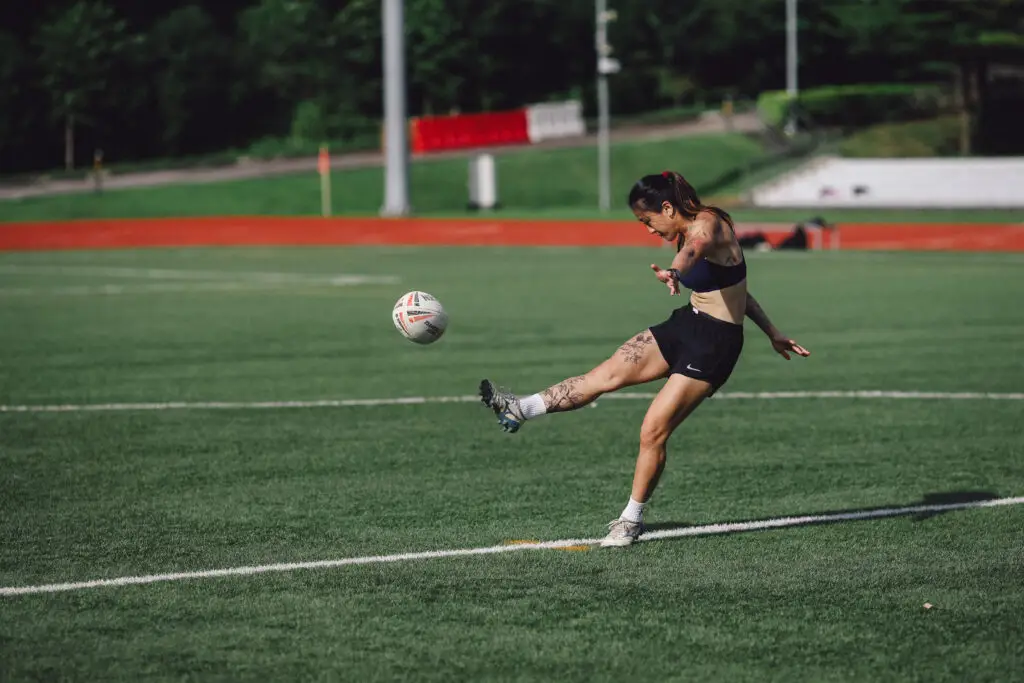
9When you were younger, did you experience any incidents that made you feel insecure about yourself?
Honestly, I’ve always struggled with insecurities about my body. Growing up, I was often told I was too small to play basketball or rugby, like I didn’t have the physical presence to play the sport, let alone compete. Or when I got too “big” in someone else’s eyes, I am not efficient with how I could contribute in my sport.
There were plenty of moments when I questioned if I belonged or if I could keep up with bigger, stronger players. But over time, I learned that size isn’t everything. It’s about determination, technique, and heart. Those doubts pushed me to work harder, sharpen my skills, and prove to myself that I could compete regardless of my stature.
Insecurity was part of my journey, but it became fuel to keep improving and believing in what I could achieve.
1Have you gone through any adversities in life that made you change how you viewed life?
The biggest adversity I’ve faced so far was tearing my ACL in 2023. It was a major turning point in my life and career. The injury itself was devastating, not just physically, but mentally. I knew it would take a long time to recover, but I don’t think I fully understood just how challenging that process would be until I was in the middle of it.
For over a year, I dedicated myself to rehab and slowly rebuilding my strength and confidence. The early stages were the hardest. There were days when I felt like I wasn’t making any progress and the frustration was overwhelming. At times, I felt completely lost and doubted whether I would ever get back on the field competitively. The fear of never playing again was very real and it was a heavy burden to carry.
But I was incredibly fortunate to have a strong support system around me. My friends and family were my lifeline during those dark moments. They kept me accountable, encouraged me when I wanted to give up, and reminded me of my worth beyond the injury. Their belief in me was sometimes stronger than my own, and that made all the difference.
Mentally, it was a battle between hope and despair, discipline and frustration. I learned that overcoming something like this isn’t just about physical healing – it’s about mental strength and resilience. There were times when I had to push myself harder than I ever had before, but also times when I had to be patient and kind to myself.
Going through this experience changed how I see life. It made me realise that the journey is just as important, if not more so than the destination. It’s about the daily grind, the setbacks, the small victories, and the relationships you build along the way. I also learned how essential it is to surround yourself with people who lift you up and believe in you, especially when you’re at your lowest.
This injury and recovery taught me so much about character and perseverance. It showed me that setbacks don’t define you, they’re part of the process of growth. And when you come back from something that felt impossible, you not only gain physical strength but also a deeper appreciation for the game and for life itself.
Now, I carry those lessons with me every time I step on the field. I’m more patient, more focused, and more grateful for every opportunity to play. This experience has made me stronger – both as an athlete and as a person – and I believe it will continue to shape me in ways I haven’t yet imagined.
When did you feel the least confident about yourself?
I felt the least confident about myself during the height of the COVID-19 period. I was working full-time long hours doing physically demanding labour, with no real work-life balance since training was paused. Stress took over and I barely managed to eat a proper meal each day. After work, all I wanted to do was sleep and I had no motivation to exercise or take care of myself.
As a result, I lost a significant amount of muscle mass and became extremely skinny, literally skin and bones. When training finally resumed, a teammate pointed out how much weight I had lost. Hearing that was a wake-up call. I realised right then that I had a lot of work ahead of me to get back to where I wanted to be.
From that moment, I committed to rebuilding not just my physique but my mindset too. I adjusted my eating habits, prioritised rest, and gradually got back into a consistent training routine. It was tough, but through discipline and determination, I regained my strength and confidence. That experience taught me the importance of balance and self-care, and it made me more resilient both on and off the field.
Did you ever struggle with your body?
Yes, I have. A lot of it came down to social expectations and the pressure to look a certain way. During the period when I lost a lot of weight, I found myself liking how I looked for the first time in a while. It felt like I was finally fitting into the “social norms” of what my body was supposed to look like.
But looking back, I realise that this wasn’t a healthy place to be. I was well below my normal weight and didn’t really look healthy. It was more of an illusion of fitting in rather than true wellbeing. At that time, it was easy to fall into that mindset, and honestly, I did for a while.
However, I quickly learned that this kind of thinking isn’t sustainable, especially as an athlete. My body needs fuel, strength, and balance to perform at its best. Staying at an unhealthy weight wasn’t just harmful physically, it also took a toll mentally and emotionally.
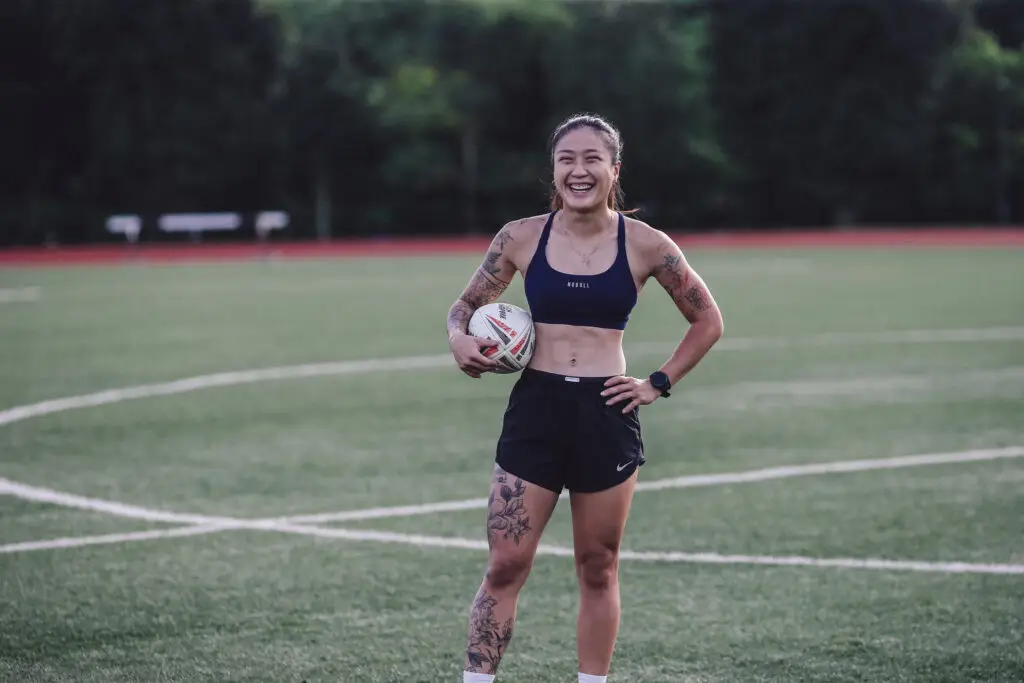
Are you satisfied with your body now?
Building on what I shared earlier, I would say I’m much more satisfied and content with my body now than I used to be. It’s not about having a perfect look or fitting any kind of ideal anymore. I shifted my focus from appearance to health and performance. I started prioritising how I felt and how my body could support me in training and competition, rather than how it looked to others. That mindset change was crucial. It helped me break free from the social stigma and develop a healthier relationship with my body and food.
I’ve learned to appreciate my body for its strength, resilience, and ability to carry me through training, competition, and everyday life. There’s a sense of pride in what it’s capable of, and that feeling far outweighs any superficial concerns I once had.
That said, I’m still human and have moments of doubt like anyone else, but overall, I’ve cultivated a healthier, kinder relationship with myself. Satisfaction now comes from balance – nourishing my body well, staying active, and embracing who I am at this stage of my journey. It’s an ongoing journey, but one that’s taught me a lot about self-acceptance and balance.
If you could change anything about yourself, would you?
If I’m being completely honest – yes, I wouldn’t mind being a little taller hahaha! But beyond that, not really. Over the years, I’ve learned to truly embrace who I am. I’ve come to understand that I’m capable of doing great things regardless of my height, body shape, or weight.
What matters most to me now is being healthy, strong, and kind. As long as I’m taking care of my body and treating people with respect, I don’t feel the need to change anything. Self-acceptance has been a journey, but it’s one that’s given me a lot more confidence and peace
